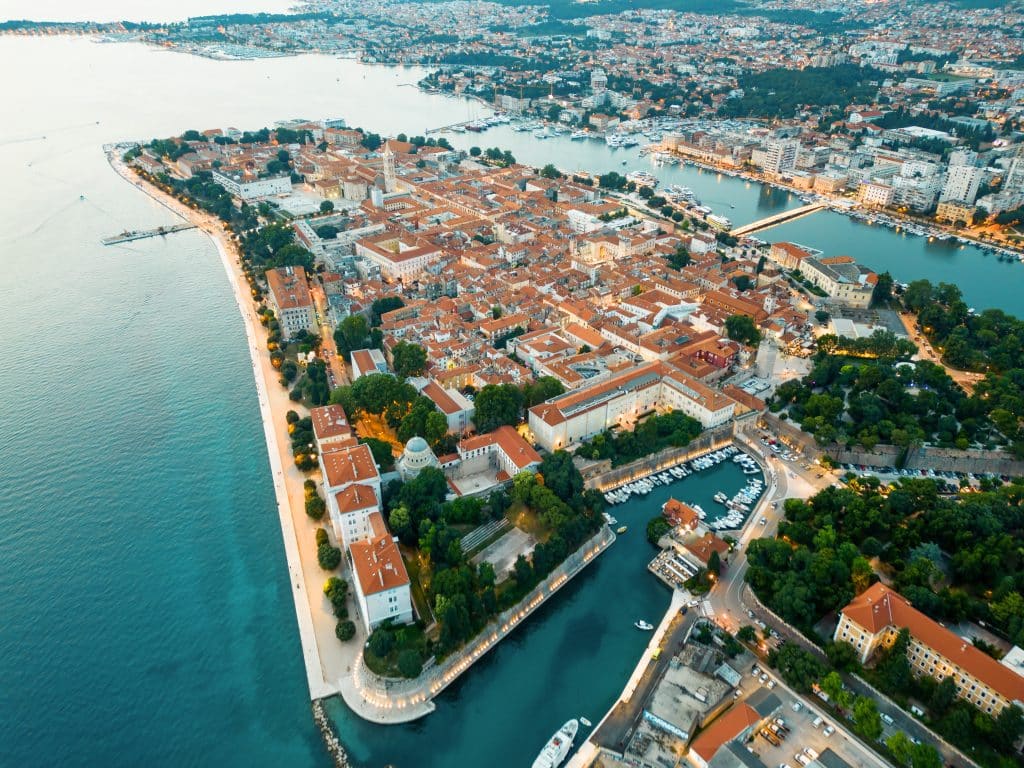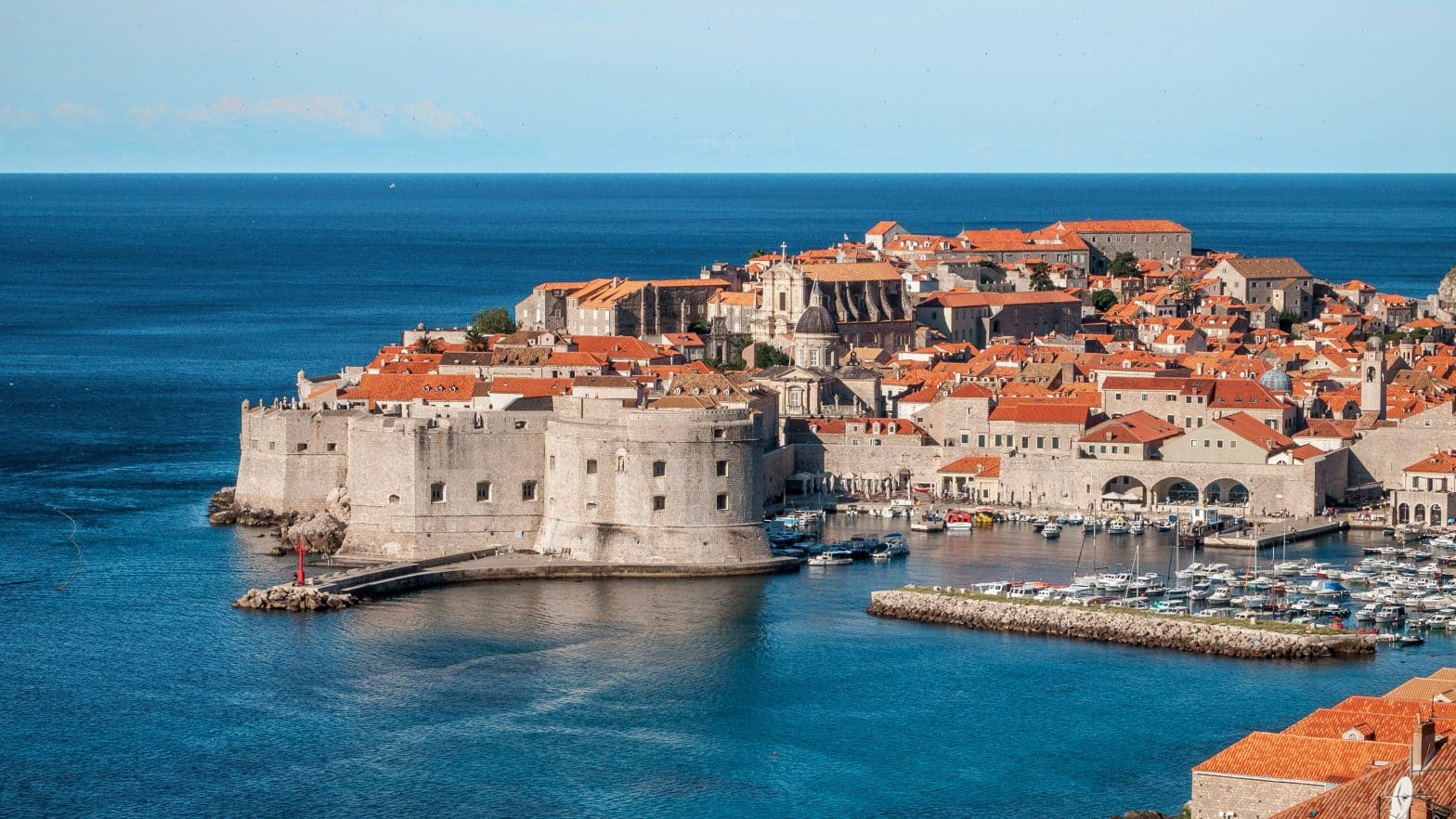Ah, Croatia! This underrated gem of Europe has plenty to offer, from its coastline and numerous islands to the architectural heritage of its cities, such as the legendary city of Dubrovnik, where Game of Thrones was filmed!
If you are thinking of moving there, whether for professional opportunities or because you have fallen in love with the country, it is normal to have many questions.
To answer them, we have put together a short guide for future expats, with our best advice to help you settle in Croatia and avoid any unexpected surprises.
The pros and cons of living in Croatia
Pros
- A pleasant living environment (natural riches, architectural and cultural heritage, Adriatic coastline, etc.)
- A Mediterranean climate, with sunny summers and mild winters
- A country with a high level of safety, ranked 19th out of 83 in the latest Global Peace Index, ahead of Germany, the United Kingdom and France
- A lower cost of living than other European countries
- A renowned culinary heritage, with Balkan and Mediterranean influences
Cons
- The language barrier is probably the main challenge for expats, although most of the population speaks English
- Croatia is also known for its bureaucratic administrative procedures … and sometimes, this is not a myth!
Administrative procedures for moving to Croatia
Obtaining the right to stay in the country
All nationals of a country that is a member of the European Economic Area (EEA) can stay in Croatia for up to 90 days without a visa.
Nationals of third countries, on the other hand, must obtain a short-stay visa by applying to the Croatian embassy or consulate in their country of current residence.
In all cases, after 90 days, all expatriates must apply for a long-term residence permit to settle in Croatia. This procedure is carried out directly at the police headquarters in your place of residence in Croatia.
The application file includes the following documents:
- An identity photo
- A valid passport or identity card
- An employment contract or proof of worker status
- A rental contract or proof of ownership
You can find all the necessary information in the dedicated section of the official website of the Croatian Ministry of the Interior.
Applying for an OIB
The second step is to apply for an ‘osobni identifikacijski broj’, or OIB, which is equivalent to a National Insurance Number in the United Kingdom.
This number is essential for:
- Opening a bank account
- Acquiring a telephone line
- Purchasing property
- Etc.
To obtain it, you must go to the Croatian tax office (Porezna uprava) and fill in the form entitled ‘Zahtjev za određivanjem i dodjeljivanjem osobnog identifikacijskog broja’ (application for the determination and allocation of a personal identification number).
Finding accommodation in Croatia
Where to live?
Croatia is traditionally divided into several regions, including Central Croatia, Istria, Dalmatia and Slavonia. These are the areas that welcome the most expatriates, particularly around the cities of Zagreb, Split, Dubrovnik, Zadar and Osijek.
Central Croatia:
Let’s start with the must-see destination for expatriates: Zagreb, the country’s capital. The city is located in the heart of central Croatia and is an economic and cultural hub par excellence, with a cosmopolitan lifestyle, numerous professional opportunities and a wide (really wide) range of activities.

Dalmatia:
Dalmatia stretches along the Adriatic coast and is home to some of the country’s most iconic coastal towns:
- Split: Croatia’s second most populous city, Split is very popular with tourists and expats. It is considered the ‘capital’ of Dalmatia and offers a fairly dynamic job market and a seaside lifestyle, with beaches, a port, cafés and terraces. There are also many konoba, the famous traditional inns serving a variety of local dishes.
- Dubrovnik: nicknamed the ‘Pearl of the Adriatic’, Dubrovnik charms visitors with its exceptional historical and cultural heritage, which is listed as a UNESCO World Heritage Site. Its landscapes and architecture attract many expats. However, the city is crowded with tourists in high season and is one of the most expensive cities in the country.
- Zadar: a former Roman city, Zadar is a city that offers a quieter lifestyle than Split or Dubrovnik. However, it should be noted that job opportunities are more limited and expats who choose to settle here generally work remotely.
Slavonia:
Slavonia, in the east, is less touristy than Dalmatia or Zagreb, with a very peaceful lifestyle. The main city in the region is Osijek, a popular economic and cultural centre. It appeals to expats looking for peace and quiet, especially families who want to get away from the big cities. There are many green spaces and a pleasant living environment, not far from the Hungarian and Serbian borders.
What to choose and at what price?
There are many different types of properties on the Croatian property market, ranging from studios to apartments, houses and villas by the sea. On average, it takes around 15 days to find accommodation.
You can use a real estate agency or search online yourself before you leave. Here are some specialised websites that may be useful:
Prices vary depending on the type of property and the city. Here is an overview of average prices in 2025:
| Unit | Zagreb | Dubrovnik | Split | Zadar | Osijek |
|---|---|---|---|---|---|
| Studio in the city centre | 750 € | 1,050 € | 900 € | 600 € | 500 € |
| Studio on the outskirts | 600 € | 750 € | 600 € | 500 € | 340 € |
| 3-bedroom apartment in the city centre | 1,300 € | 1,500 € | 1,700 € | 1,100 € | 820 € |
| 3-bedroom apartment on the outskirts of the city | 920 € | 1,100 € | 1,200 € | 950 € | 620 € |
| Purchase price per square metre | 2,500 € – 6,000 € | 3,500 € – 6,000 € | 3,500 € – 7,000 € | 2,800 € – 4,250 € | 1,600 € – 2,500 € |
The cost of living in Croatia
The cost of living in Croatia remains affordable compared to other European countries. A single person should expect to spend around €1,350 per month, and a family of four should expect to spend €3,700 on average, including rent.
The main expenses are groceries, housing and transport. However, the budget required varies depending on the city. For example, Split and Dubrovnik are on average 12% more expensive than the capital.
If you are interested in this topic, check out our comprehensive guide to the cost of living in Croatia!
Getting around like the Croatians
The car is undoubtedly one of the most widely used means of transport in Croatia. As a British citizen or a national of an EU or EEA member state, your driving licence is valid in Croatia. If you come from a third country, your licence is generally recognised for a maximum of one year, after which you will need to convert it to a Croatian licence.
When it comes to public transport, the bus is king. They are used for both urban and long-distance journeys, thanks to an excellent and well-organised network.
The train is also an option for long distances. However, you will need to be patient: train journeys are relatively slow …
To connect the mainland to the various islands, or the islands to each other, the ferry is of course the number one option. We recommend checking the connections offered by the country’s largest shipping company, Jadrolinija. Here is its official website (available in Croatian and English): https://www.jadrolinija.hr
Finally, air travel, and more specifically the domestic flights offered by Croatia Airlines, should be considered for long journeys between major cities such as Zagreb, Split, Dubrovnik, Pula and Osijek.
Family life in Croatia
Croatia is an ideal country to live in as a family, as it is very safe and offers a great living environment for both parents and children, with plenty of leisure activities to enjoy on the beach, in the countryside or in the city.
In terms of education, children can attend public or private schools. Young children generally learn Croatian quite quickly, which makes it easier for them to integrate and become bilingual or even trilingual. This can also be an advantage for parents, who learn Croatian more naturally through contact with their children!
Here are some of the best private schools in the country:
- Split International School
- American International School of Zagreb
- École française internationale de Zagreb
Working in Croatia
If you are a citizen of an EU country, you can work in Croatia for 90 days without a work permit. After that, you can continue working if you have a long-term residence permit.
If you are a third-country national, you must obtain a work permit, which is usually arranged by your employer.
Finding a job

Certain sectors recruit more expatriates, including:
- New technologies
- IT
- Transport
- Construction
According to the latest statistics from Trading Economics, the unemployment rate in Croatia is 3.8%. However, expatriates benefit from a special market, as they are often considered qualified and sought after by national and international companies, particularly for positions of leadership.
If you are looking for a job, here are the main Croatian websites specialising in this field:
Taxation for expatriates
You are taxable in Croatia if:
- You live there for more than 183 days per year.
- Or if you have your permanent residence there.
The Croatian tax rate is progressive, ranging from 15% to 35%, and applies to all types of income, whether from Croatia or abroad.
Certain tax treaties protect expatriates from double taxation. This means you don’t have to pay tax twice on the same income.
Healthcare in Croatia
Medical care in Croatia is of a good standard, particularly in healthcare facilities located in the capital, such as KBC Zagreb and Merkur Hospital.
All residents in Croatia must register for universal public health insurance, which is managed by the Croatian Health Insurance Fund (HZZO).
In addition to the public healthcare system, expats generally take out private health insurance. This gives them more comprehensive and, above all, personalised cover, tailored to their needs and those of their family.
As an expatriate, you can choose to take out private international health insurance, such as that offered by Foyer Global Health.
We offer insurance designed to meet your needs, with services tailored to you:
- Coverage valid in Croatia, in your home country and anywhere in the world
- Access to quality care at the facility of your choice
- A second medical opinion available online via Teladoc Health®
- And wellness services, such as mental health coaching and a fitness programme
